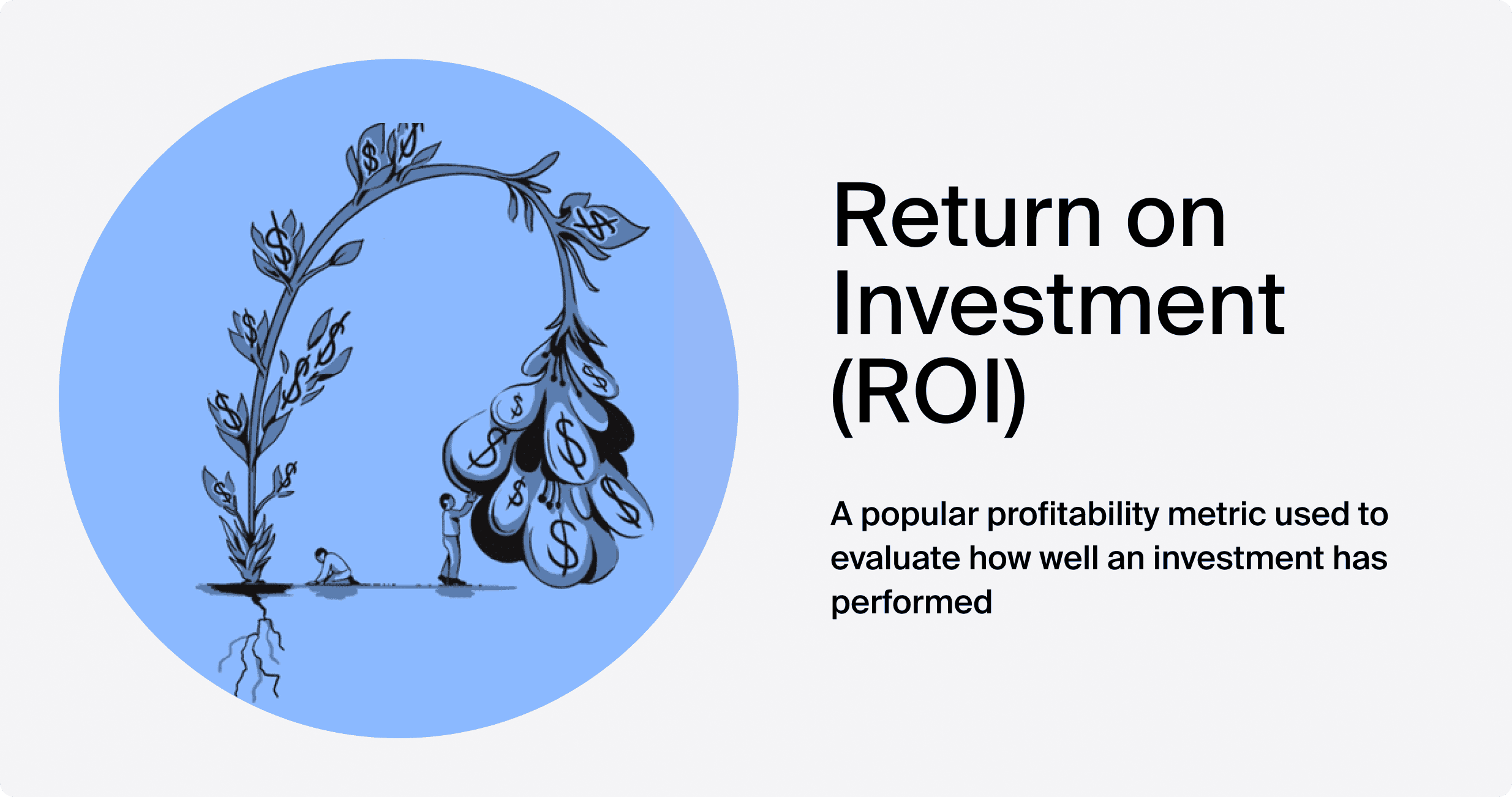
Understanding and effectively utilising Return on Investment is paramount for businesses and investors alike. Return on Investment or ROI serves as a barometer for evaluating the profitability and efficiency of investments. In this article, we will explore ROI meaning, the benefits of it while acknowledging its limitations. Additionally, we will provide insights on how to calculate ROI, steps to enhance it, and alternative metrics tailored to the specific demands of the market.

Return on Investment (ROI) is a financial metric that evaluates the profitability of an investment. It is expressed as a percentage and represents the ratio of net profit to the initial cost of the investment.
Pros of ROI include:
Here are cons of ROI:
The Return on Investment Formula for ROI is straightforward:
ROI = (Net Profit / Cost of Investment) × 100
Let's consider a practical example: A manufacturing company invests ZAR 2 million in new machinery, incurring additional operating costs of ZAR 500,000. The machinery generates an extra ZAR 1.5 million in annual profit.
Net Profit = Revenue − Costs
Net Profit = ZAR 1,500,000 − ZAR 500,000 = ZAR 1,000,000
ROI = (ZAR 1,000,000 / ZAR 2,000,000) × 100 = 50 %
This indicates a 50% Return on the Investment.
Interpreting ROI is crucial for making informed decisions. Here's how to interpret ROI effectively:
Increasing Return on Investment requires strategic planning and execution. Here are key steps to enhance ROI:
Localised Market Analysis
Conduct a thorough analysis of the market to identify trends, risks, and opportunities specific to the country.
Operational Efficiency
Streamline operations to reduce costs, enhance productivity, and maximise the efficiency of resources, aligning with the nuances of the local market.
Here are broader applications of Return on Investment:
Understanding and effectively utilising ROI is paramount. It serves as a compass for decision-making, enabling investors and businesses to optimise their financial strategies.
Lloyd has been trading, investing and teaching about financial markets for over a decade. He has a thorough understanding of financial services provider legislation as well as investment asset classes and categories. Lloyd is a certified RE5 representative and holds a COB Investment certificate from the Moonstone Business School of Excellence.
ROI is crucial for small businesses to assess the profitability of investments, guiding resource allocation for sustainable growth.
Yes, a negative ROI indicates that the investment has incurred a loss, highlighting the need for reassessment or strategic adjustments.
Social ROI is measured by assessing the societal impact of an investment, considering factors beyond financial gains, such as social and environmental benefits.
© 2025 BROKSTOCK SA (PTY) LTD.
BROKSTOCK SA (PTY) LTD is an authorised Financial Service Provider and is regulated by the South African Financial Sector Conduct Authority (FSP No.51404). BROKSTOCK SA (PTY) LTD Proprietary Limited trading as BROKSTOCK. BROKSTOCK SA (PTY) LTD t/a BROKSTOCK acts solely as an intermediary in terms of the FAIS Act, rendering only an intermediary service (i.e., no market making is conducted by BROKSTOCK SA (PTY) LTD t/a BROKSTOCK) in relation to derivative products (CFDs) offered by the liquidity providers. Therefore, BROKSTOCK SA (PTY) LTD t/a BROKSTOCK does not act as the principal or the counterparty to any of its transactions.
The materials on this website (the “Site”) are intended for informational purposes only. Use of and access to the Site and the information, materials, services, and other content available on or through the Site (“Content”) are subject to the laws of South Africa.
Risk notice Margin trading in financial instruments carries a high level of risk, and may not be suitable for all users. It is essential to understand that investing in financial instruments requires extensive knowledge and significant experience in the investment field, as well as an understanding of the nature and complexity of financial instruments, and the ability to determine the volume of investment and assess the associated risks. BROKSTOCK SA (PTY) LTD pays attention to the fact that quotes, charts and conversion rates, prices, analytic indicators and other data presented on this website may not correspond to quotes on trading platforms and are not necessarily real-time nor accurate. The delay of the data in relation to real-time is equal to 15 minutes but is not limited. This indicates that prices may differ from actual prices in the relevant market, and are not suitable for trading purposes. Before deciding to trade the products offered by BROKSTOCK SA (PTY) LTD, a user should carefully consider his objectives, financial position, needs and level of experience. The Content is for informational purposes only and it should not construe any such information or other material as legal, tax, investment, financial, or other advice. BROKSTOCK SA (PTY) LTD will not accept any liability for loss or damage as a result of reliance on the information contained within this Site including data, quotes, conversion rates, etc.
Third party content BROKSTOCK SA (PTY) LTD may provide materials produced by third parties or links to other websites. Such materials and websites are provided by third parties and are not under BROKSTOCK SA (PTY) LTD's direct control. In exchange for using the Site, the user agrees not to hold BROKSTOCK SA (PTY) LTD, its affiliates or any third party service provider liable for any possible claim for damages arising from any decision user makes based on information or other Content made available to the user through the Site.
Limitation of liability The user’s exclusive remedy for dissatisfaction with the Site and Content is to discontinue using the Site and Content. BROKSTOCK SA (PTY) LTD is not liable for any direct, indirect, incidental, consequential, special or punitive damages. Working with BROKSTOCK SA (PTY) LTD you are trading share CFDs. When trading CFDs on shares you do not own the underlying asset. Share CFDs are complex instruments and come with a high risk of losing money rapidly due to leverage. A high percentage of retail traders accounts lose money when trading CFDs with their provider. All rights reserved. Any use of Site materials without permission is prohibited.